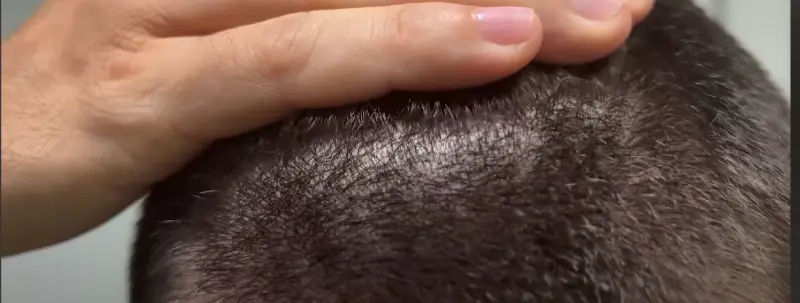Dandruff can cause your head to itch due to various conditions like seborrhoeic dermatitis, psoriasis, and, of course, dandruff itself. These conditions can cause itchy scalps, affecting about 50% of the population. Identifying the specific cause can help find the right treatment to alleviate the itching.
Yes, dandruff can contribute to itching while cycling due to the warm, moist microclimate under your helmet. The combination of sweat and increased temperature creates an environment where dandruff-causing microbes thrive, potentially worsening the issue. This can lead to discomfort and itchiness during cycling sessions.
In this article, we’ll dive into the connection between dandruff and head itching during cycling, including the causes, symptoms, and practical solutions to keep you riding itch-free.
Does Dandruff Make Your Head Itch While Cycling? 3 Effects

Cycling is a great way to stay fit and enjoy the outdoors. But for some, it can have an annoying side effect: itchy scalp caused by dandruff. Let’s look at how cycling can make this problem worse.
Sweat and Heat
When you cycle, your body heats up, and you sweat. This is normal, but this sweat can get trapped under a helmet, leading to more itching.
- Sweat Build-up: Sweat can mix with oils on your scalp, making dandruff worse.
- Heat Accumulation: The heat inside your helmet can irritate your scalp, causing more flakes and itchiness.
Friction
Your helmet is essential for safety but can also cause dandruff problems.
- Constant Rubbing: The friction from your helmet rubbing against your head can irritate your scalp.
- Increased Sensitivity: This irritation can make your scalp more sensitive, leading to dandruff and itching.
Environmental Factors
The great outdoors can be tough on your scalp, especially when combined with the effects of cycling.
- Wind Exposure: Wind can dry out your scalp, making dandruff worse.
- Sun’s Impact: Too much sun can burn your scalp, causing it to flake.
- Pollution: Dust and pollution can stick to your scalp, leading to irritation and dandruff.
3 Negative Impacts of Dandruff on Cycling Performance
Dandruff not only makes your head itch but also affects your cycling performance. Let’s explore how constant itching can impact your ride.
Distraction
An itchy scalp can be a big distraction when you are cycling.
- Loss of Focus: Constantly itching your head takes your attention away from the road.
- Safety Risk: Not paying full attention can lead to accidents or missing essential turns.
Comfort
Discomfort from dandruff can change how you cycle and feel about riding.
- Reduced Enjoyment: Constant itchiness can make cycling less fun.
- Poor Technique: You might change your posture or grip because you feel uncomfortable, affecting your cycling form.
Skin Health
Ignoring dandruff can harm your scalp over time.
- Worsening Condition: If dandruff is not treated, it can get worse and cause more itching.
- Long-term Issues: Persistent dandruff can lead to serious scalp problems, like infections or hair loss.
Solutions to Manage Dandruff and Itching

You can stay fit by cycling, but dandruff and itchy scalp can be frustrating. Here are some simple solutions to help you manage these issues and enjoy your rides more.
Proper Helmet Hygiene
Keeping your helmet clean is very important. A dirty helmet can lead to bacterial growth, which makes dandruff worse. Follow these tips to keep your helmet fresh:
- Wash the helmet pads regularly: Use mild soap and water.
- Dry thoroughly before use: Wet helmets can encourage bacteria.
- Keep in a cool, dry place: To avoid moisture buildup.
Shampoo and Hair Care Products
A good hair care product can make a big difference. Anti-dandruff shampoos and scalp treatments can help reduce itching and flakes. Here’s what to look for:
- Anti-dandruff shampoos: Look for zinc pyrithione, salicylic acid, or ketoconazole.
- Scalp treatments: Products with tea tree oil or aloe vera can soothe itching.
Regular Hair Care Routine
A consistent hair care routine is essential, especially if you cycle often. Washing your hair after each ride helps remove sweat and dirt that can cause dandruff.
- Shampoo after cycling: Use a mild, anti-dandruff shampoo.
- Condition your hair: It keeps your scalp moisturized and healthy.
- Avoid over-washing: Too much washing can strip natural oils, worsening dandruff.
Hydration and Diet
Diet and hydration can also help manage dandruff. Dehydration and poor nutrition can affect your scalp health.
- Drink plenty of water: Aim for at least 8 glasses a day.
- Eat a balanced diet: Include fruits, vegetables, and whole grains.
- Reduce sugar and fried foods: These can trigger dandruff.
Consulting a Dermatologist
If dandruff and itching persist despite trying these solutions, it might be time to see a dermatologist. They can offer professional advice and treatments tailored to your needs.
- Seek professional help: If over-the-counter products aren’t working.
- Follow prescribed treatments: Stick to the regimen suggested by your dermatologist.
Conclusion
Dandruff can significantly impact your cycling experience, causing relentless itching, discomfort, and potential long-term scalp issues. The right strategies, like maintaining proper helmet hygiene, using effective hair care products, and staying hydrated, can manage and prevent these issues.
Don’t let dandruff get in the way of your cycling adventures. Take proactive steps now to ensure every ride is comfortable and enjoyable. Try out some suggested solutions and see what works best for you.
FAQs
What Is The Effect Of Dandruff On Hair Growth?
Severe dandruff can lead to scalp injury from excessive scratching, resulting in inflammation and potential hair follicle damage. This damage may impede hair growth by causing scarring and weakening the hair, leading to thinning or halted growth.
Do Frequent Hair Washes Reduce Dandruff?
Frequent hair washes can reduce dandruff. In an Epidemiological Study, participants washing their hair more frequently experienced less flaking, itch, and dryness, as confirmed by experts and self-perception.


